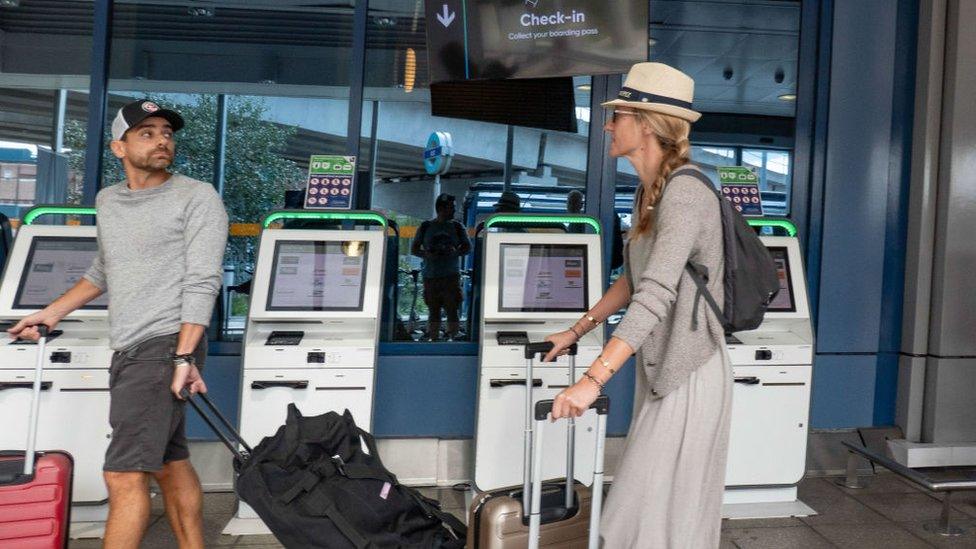Buckle up for more turbulence in the airline industry
- Published
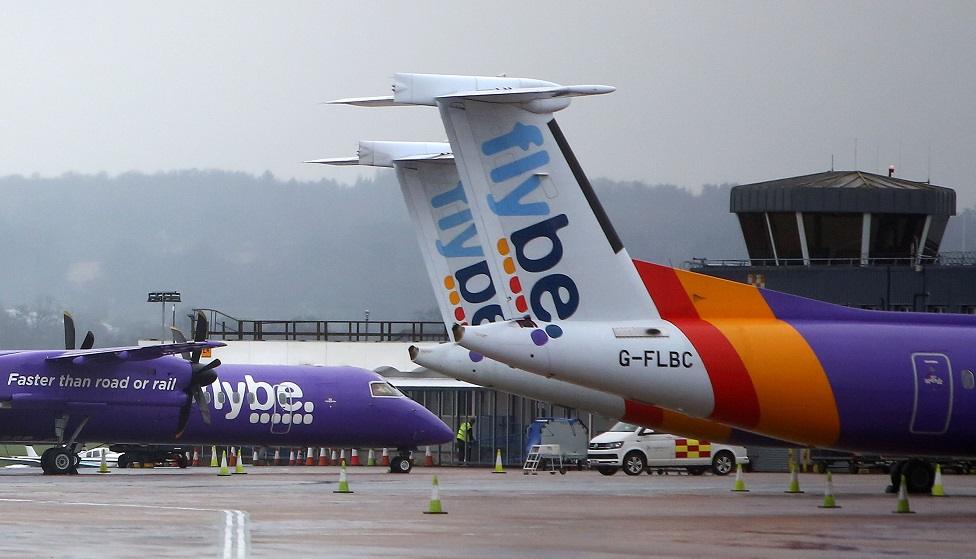
Flybe flights were grounded after the firm collapsed into administration
Airlines have long been risky investments, and they're in for a turbulent journey as coronavirus spreads. Flybe was particularly weak, but others are vulnerable.
Loganair's move to pick up 16 routes may look hasty, but it's been carefully planned, to avoid the Renfrewshire-based airline becoming another casualty.
The industry's own forecast for worldwide loss of revenue this year look eye-watering - potentially as severe as the financial crash of 2008, which brought down several airlines.
Running an airline has always been more about the glamour than profit. There are good years, but they come with a lot of risk, and with bad years.
There are high fixed costs, but passenger demand is fickle. So is the oil price, and currency hedging is a big challenge.
And growing one's market share is for those with deep pockets, such as those stitched into Arab attire. Etihad, based in Abu Dhabi, on Thursday reported an $870m (£660m) loss for 2019, adding to $4.67bn (£3.5bn) of losses over the previous three years. It plans to break even in 2023.
Thirteen years ago, on the anniversary of the Wright brothers' pioneering flight, the US investment sage Warren Buffett told his disciples: "If a farsighted capitalist had been present at Kitty Hawk, he would have done his successors a huge favour by shooting Orville down".
So Flybe has joined a long list of those that flew too high, or ran out of financial fuel. It had lots going wrong, and for some time. Too many aircraft, of too many types, on poor leasing terms, earned it losses for most of the past 10 years. It tried lots of changes, including a split from its Loganair partner on Scottish island flights.
That now looks fortuitous, both because it meant island routes avoided the trauma of the Flybe collapse, and it was the starting point for Loganair to expand.
With Flybe's collapse, the political response has sounded as if this airline was providing a lifeline service to Britain's smaller city airports. The service was to passengers, yes, and also to the airport operators, because these routes kept them open.
Southampton is one example. Some 95% of its flights were Flybe. That matters to Scottish aviation, because Southampton is owned by the same company that controls Glasgow and Aberdeen, and it's thought to be the preferred and officially anonymous bidder for Prestwick Airport.
As such, AGS may have less capital than it had planned on at the time the Scottish government welcomed its bid to take the loss-making Ayrshire airport off ministers' hands and taxpayers' books.
A rare survivor
For all the early talk of "devastation" from the Flybe collapse, a few hours later it didn't look quite so bad, at least for travellers. The uncertainty continues for a lot of Flybe staff and those contracted to the company.
Loganair was quick to pick up 16 of the more attractive routes - but to do so carefully. This is not so much a vulture operation as a relief, bringing with it recruitment of around 100 people.
At its Glasgow Airport headquarters, Jonathan Hinkles, the chief executive, took the opportunity of recent weeks - while Flybe, its owners and the UK government tried to settle on a rescue package - to plan for only the routes that are a good fit. He wants to reassure investors that he isn't overstretching the way others have.
It is only a year since he took a previous opportunity from the failure of an airline, in that case Flybmi. It brought city routes taking Loganair into deepest England and across the North Sea.
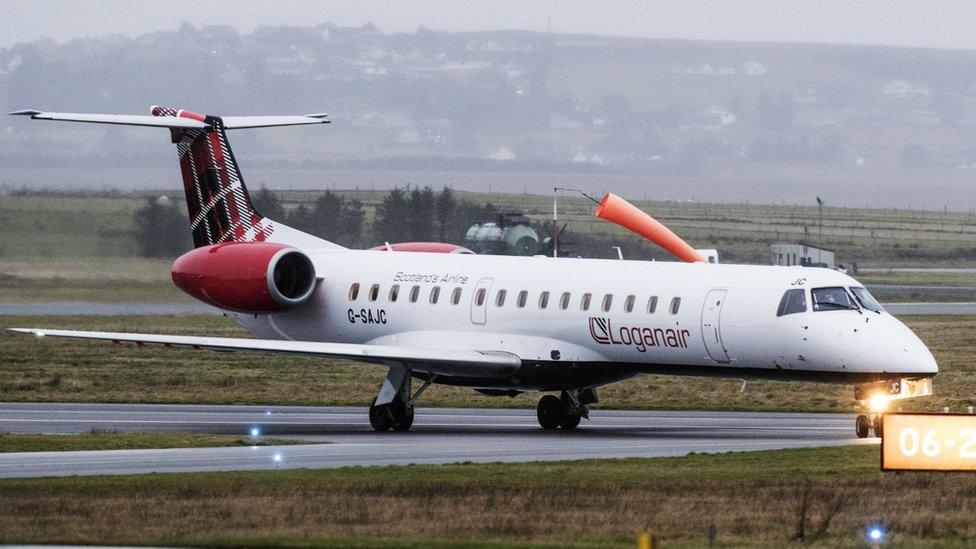
The additional routes to Loganair's network will see the airline operate up to 400 new services a week
So while picking up on others' failure, Hinkles has to be careful not to become the next one. In only around 15 years of British flying, we've waved off not only Flybmi, but bmibaby, Scot Airways, later failing as Suckling Air, Monarch, Globespan and Thomas Cook. To that list, add Zoom, the Scots-based low-price carrier which was grounded in 2008, when its managing director was one Jonathan Hinkles.
Meanwhile, other airlines avoided failure by being merged into British Airways and Flybe. Through such change, Loganair is a rare survivor, and that's the way Mr Hinkles wants to keep it.
"The plan represents the outcome of several weeks of behind-the-scenes contingency planning work, during which we've evaluated many routes and aircraft," he says. "It's critical to the continued success of our own airline that we refrain from over-expansion, and that our growth can be delivered within our operational and financial means".
Competing with rail
So Loganair is picking up Flybe routes from bases it already operates in Aberdeen, Edinburgh, Glasgow, Inverness and Newcastle. These are particularly important for the energy industry, bringing offshore workers into Aberdeen from across the UK, with Eastern Airways continuing to operate joint Flybe routes to Humberside and Teesside.
The choice of those bases partly reflects Loganair's footprint in Scotland, climbing and maintaining altitude over nearly 60 years. It also reflects the fact that flying is a relatively attractive option for those travelling in and out of Scotland, simply because of distance. The same goes for Northern Ireland, with added seawater.
English and Welsh regional airports tend to compete less favourably with the train or road. As train use has gone up sharply, their scheduled flights in and out of London airports have fallen back. Add in "flight shame" for those who fret about their carbon footprint, and the more exposed English bases, where the absence of Flybe may hurt most, look like being in the south-west.
Take a holiday
Will other airlines be grounded or forced into takeovers in the coming months? Almost certainly, if the industry's global governing body is any guide. In late February (only a few days ago, remember?) IATA, the international air travel association, set out a projection of the losses that might be expected if coronavirus could be contained. That looked like a whopping $27bn (£21bn) loss of revenue, almost all of that in and around China, or more distant airlines that have routes into Asia.
But with the latest developments in the spread of the virus into Europe and North America, it has re-run its financial models. Containment of the current trends, to those countries with more than 100 cases already, would bring an 11% drop in passenger numbers and a loss of $63bn, external (£48bn), IATA reckons. Most of that loss would be in and around China.
But if there is extensive spread to countries which have more than 10 cases already, IATA forecasts a drop of 19% in air passengers worldwide, and 24% fewer in the UK and nearby European nations. In that case, the global hit would be a drop in revenue of around $113bn (£86bn), with western Europe and the UK taking nearly a third of that hit. The industry's downturn would be on the same scale as the financial crash of 2008.
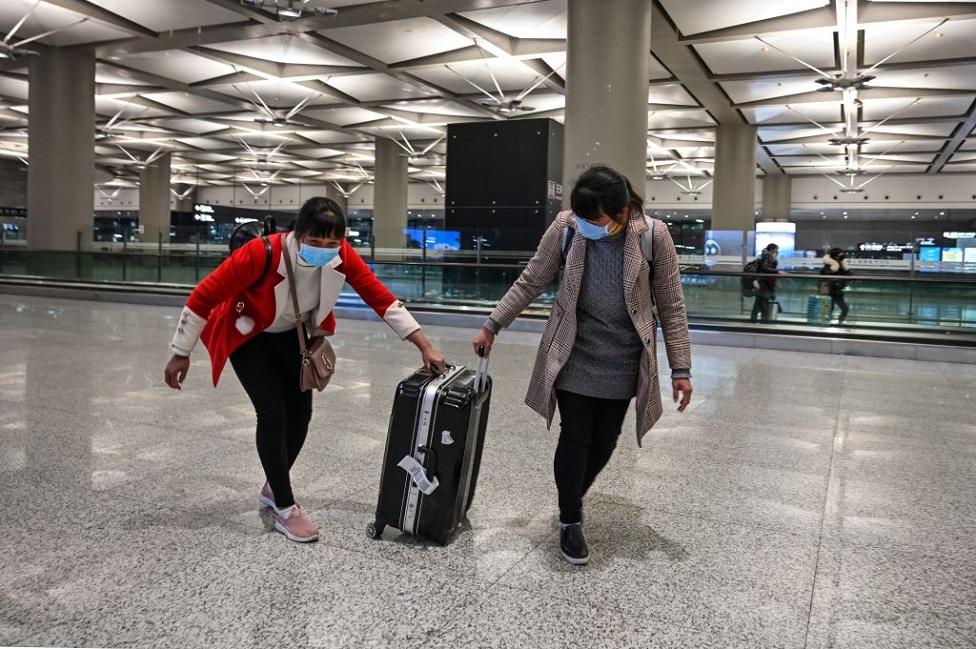
The coronavirus outbreak is affecting airlines' profits
Some are already taking action. Thursday brought 2,000 flight flight cancellations from Portugal's TAP, while Norwegian Air cut back on the frequency of trans-Atlantic flights, and planned a 15% cut in capacity.
British Airways and Ryanair have already said they're scaling back operations where the virus outbreak has so far hit hardest. United Airlines, one of America's big four, said it was cutting capacity by 20% on international routes, with a 10% cut on domestic US flights. Things look so severe at Virgin Atlantic that the chief executive is actually taking a pay cut.
Emirates and Etihad are asking staff to bring forward leave planned for later this year to the spring months, or to take a month of unpaid leave when it's looking alarmingly quiet.
For an industry that is held up as an example to every other in its attention to safety, that scale of financial risk looks overwhelming for airlines that aren't strapped in for some very bumpy turbulence.
Final frontier
On a more positive postscript about the aviation industry, it's worth noting recent success for aerospace in Scotland. Airbus orders are bringing more work and 100 more jobs to the Spirit Aerosystems factory next to Prestwick Airport, where they assemble the leading edges for passenger plane wings.
Airbus's sworn enemy, Boeing, has also raised its activities in Scotland, with a commitment to the advanced manufacturing centre - a landmark industrial building which has just secured planning permission at Inchinnan, next to Glasgow Airport.
The intention is to develop strong materials that cut weight and fuel use. Improving the industry's green credentials with that sort of research and development is a very high priority. Boeing also wants to plug into Scotland's growing expertise in space technology.
There's an irony somewhere in both aerospace giants looking to Scottish expertise and skill, while their battle over unfair subsidies has resulted in a 25% US tariff on imports of single malt Scotch, cashmere sweaters and shortbread.
- Published5 March 2020
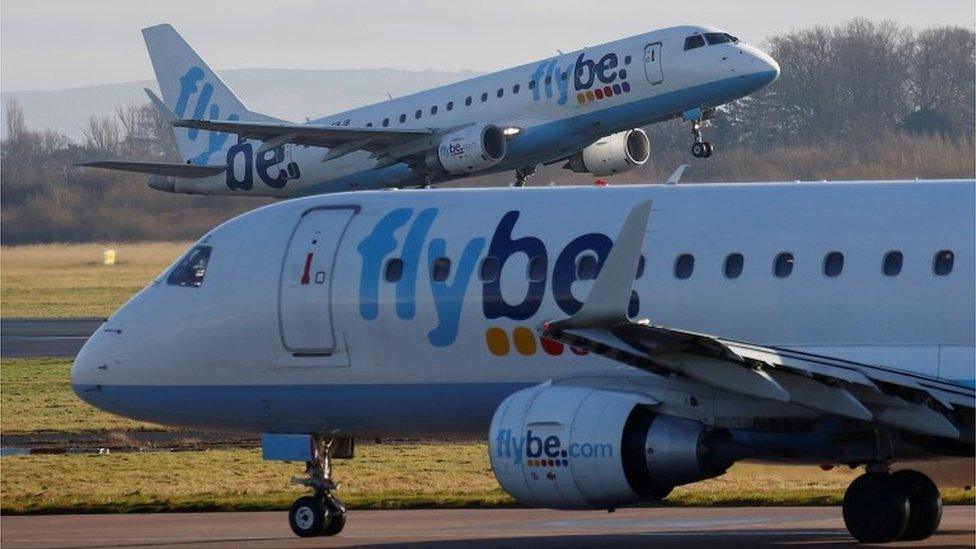
- Published5 March 2020
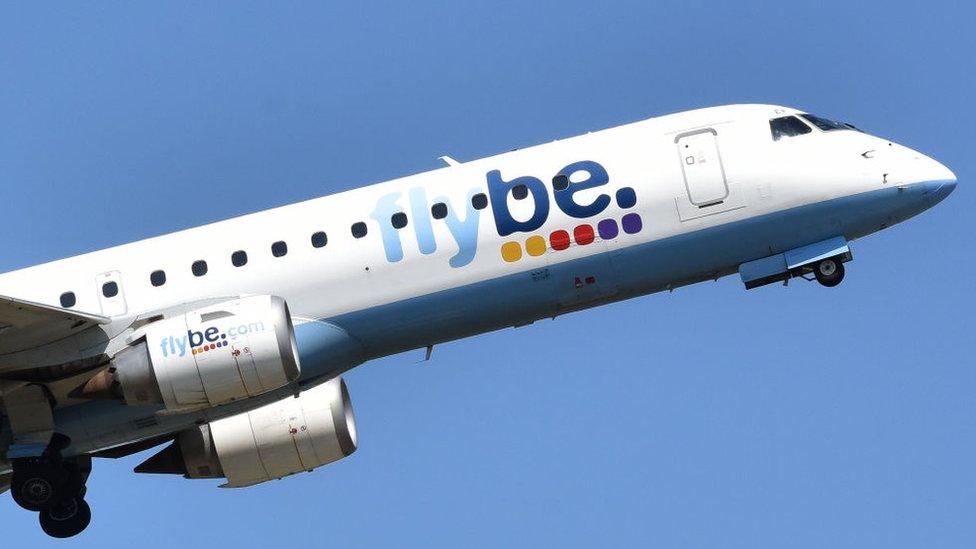
- Published5 March 2020
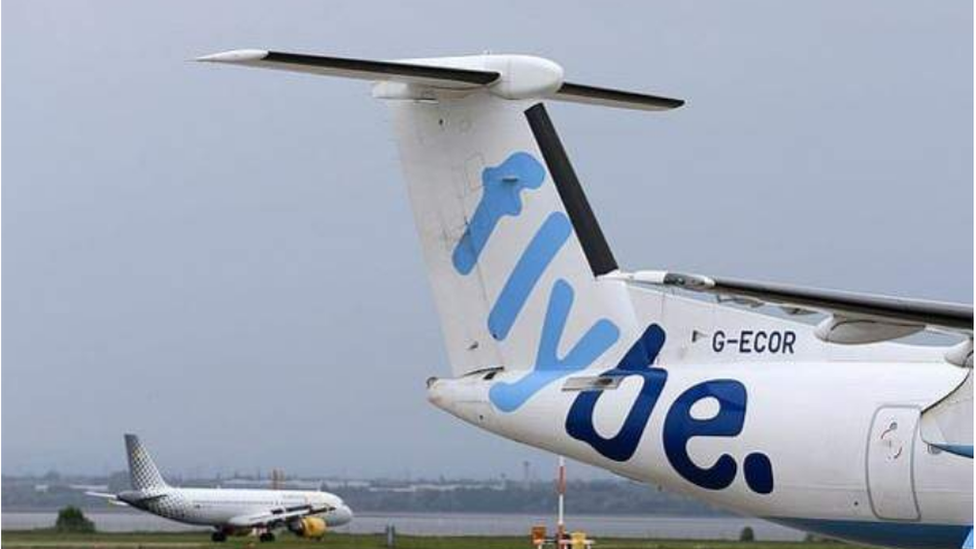
- Published5 March 2020
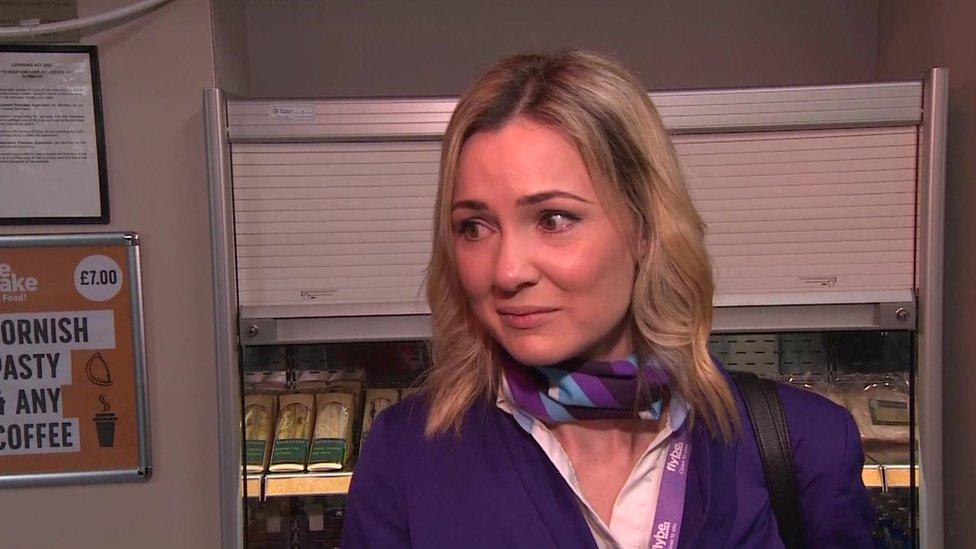
- Published5 March 2020
